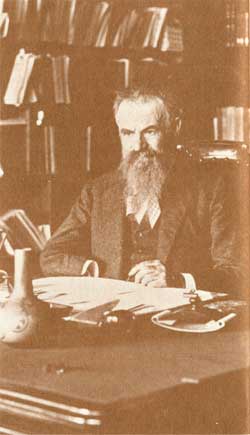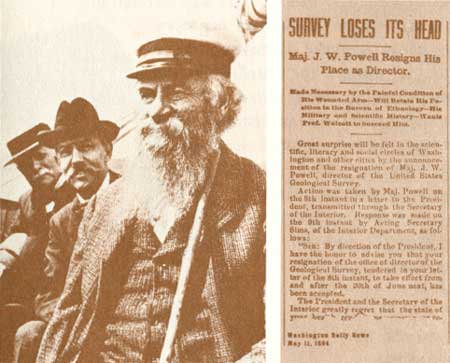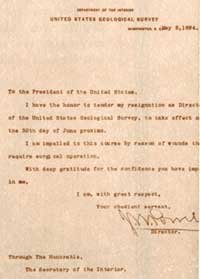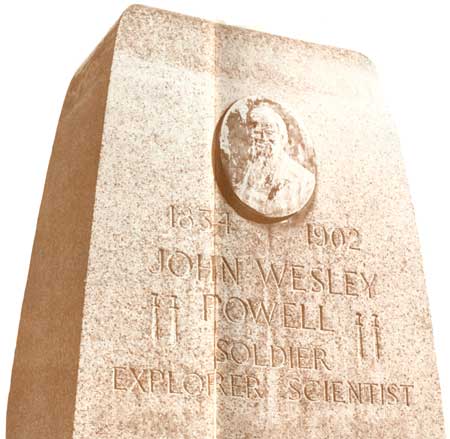
|
Geological Survey Information 74-24
John Wesley Powell: Soldier, Explorer, Scientist |

|
| John Wesley Powell in his Adams Building Office, Washington, D. C., 1896. |
During the 13 years of Powell's directorate the growth of the Geological Survey was remarkable. Its field of operations, at first restricted to the Far West, became nationwide. The annual appropriation was gradually increased, and from time to time new functions were added, the most important being a program of topographic mapping and investigation of water resources and irrigation. New divisions of chemistry, physics, paleontology, and hydrography were also added.
In 1884, Congress set up a joint commission to consider the organization of several of the scientific bureaus, including the Geological Survey, in order to "secure greater efficiency and economy." The National Academy of Sciences was again called on for advice, and its committee made some specific recommendations. Their chief goals were the formulation of a general plan for science in government and the establishment of a Department of Science. In the lengthy hearings that followed, Major Powell was called several times to testify, not only on the operation and management of the Geological Survey, but also on his views of the place of science in government.
Midway in the hearings there was a change of administration, and the search for efficiency and economy became an investigation of corruption. Powell and the Survey became the target of bitter attack. In the end, however, the Commission found the administration of the Geological Survey to be well conducted, and they recognized the wisdom of a geological survey of the whole country. Geologic research was established as a proper function of the Government.
In 1888, following a series of dry years, Congress, on Powell's recommendation, authorized the Survey to undertake a study of the arid regions of the United States with special emphasis to be placed on investigations of stream capacities and potential sites for dams, reservoirs, ditches, and other irrigation facilities.
The House added an amendment requiring that all irrigable lands be withdrawn from entry. This effectively closed the land to the homesteader. After about 2 years the Irrigation Survey was discontinued, and Congress eliminated the power to reserve irrigable land. Powell's vision of an orderly settlement of the West was not to become a reality. Ultimately, the Irrigation Survey led to the establishment of the Reclamation Service and then the Bureau of Reclamation.
On June 30, 1894, Powell resigned as Director of the U.S. Geological Survey. He had been in poor health for a number of years, and surgery was once more required on his arm. Major Powell's health declined steadily after his resignation, and he died at his summer home in Haven, Maine, on September 23, 1902, in his 69th year. He was buried in Arlington Cemetery among other heroes of the Civil War.

|
| Major Powell and companions off the coast of Maine during retirement years. |

|
| Resignation of directorship of the U.S. Geological Survey. |
Though honored and respected by the scientific community, Powell was for many years over looked by historians. Only recently has the significance of his ideas been rediscovered.
Powell, however, was not without recognition in his own time. He was elected a member of the Philosophical Society of Washington in 1874 and its president in 1883 and a member of the National Academy of Sciences in 1880. He was a founder of the Cosmos Club and its president during 1878 and 1888, a founder and president of the Anthropological Society of Washington, one of the earliest members of the Biological Society of Washington, and an organizer of the Geological Society of Washington. He helped establish the National Geographic Society and the Geological Society of America. In 1888, he was elected president of the American Association for the Advancement of Science, then considered the highest honor for an American scientist, and he received honorary degrees from several universities at home and abroad.
His place among his contemporaries was fittingly expressed by G. K. Gilbert, the eminent geologist and his long-time associate, at a meeting commemorating Powell's achievements. Speaking of Powell before the Washington Academy of Sciences on February 16, 1903, Gilbert said:
The glow of his enthusiasm, the illumination of his broad philosophy, the warmth of his friendship, are still with us. . . . It was through this personality too that he accomplished much of his work for science. Gathering about him the ablest men he could secure, he was yet always the intellectual leader, and few of his colleagues could withstand the influence of his master mind. Phenomenally fertile in his ideas, he was absolutely free in their communication with the result that many of his suggestions—a number which can never be known—were unconsciously appropriated by his associates and incorporated in their published results. . . . The scientific produce which he directly and indirectly inspired may equal, or even exceed that which stands in his own name.

|
| Monument erected about 1914 to honor John Wesley Powell. Arlington National Cemetery, Arlington, Virginia. |
| <<< Previous | <<< Cover >>> | Next >>> |
inf/74-24/sec6.htm
Last Updated: 28-Mar-2006